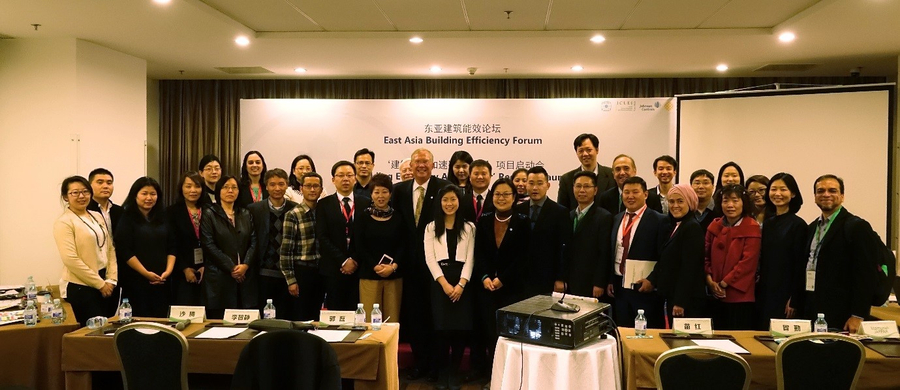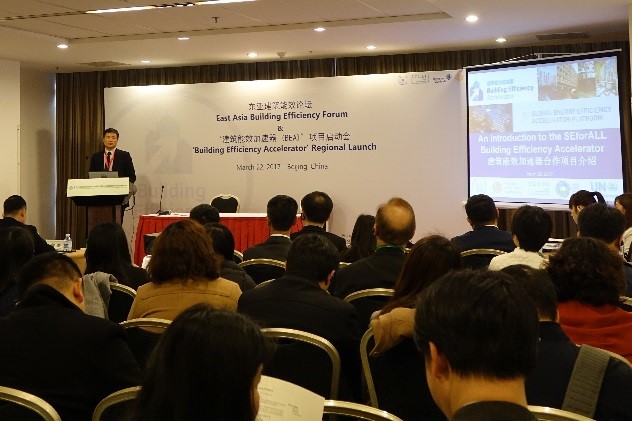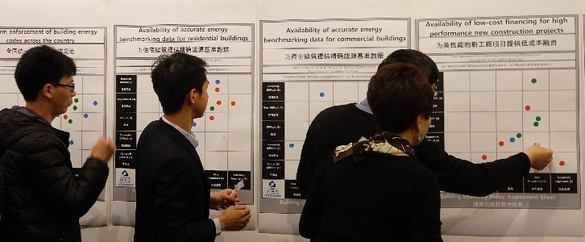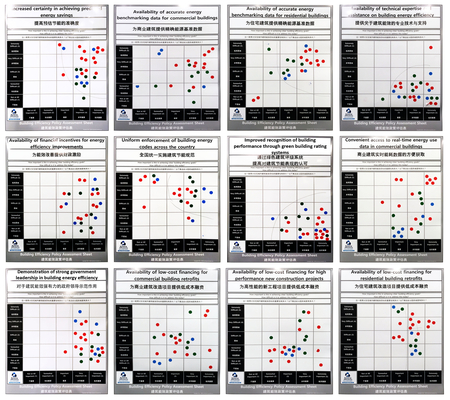ICLEI co-launches the Building Efficiency Accelerator (BEA) in East Asia

As the East Asia regional lead of SEforALL’s Building Efficiency Accelerator, ICLEI–Local Governments for Sustainability East Asia Secretariat co-hosted an East Asia Building Efficiency Forum with the East Asia launch of the BEA on 22 March 2017 at the China National Convention Center in Beijing.
One of six accelerator programs within the UN’s Sustainable Energy For All (SEforALL) Initiative, the Building Efficiency Accelerator (BEA) assists sub-national governments in speeding up the process of adopting best-practice policies and implementing building efficiency projects, with the goal of doubling the rate of energy efficiency improvement in the building sector by 2030.
The BEA regional launch brought together stakeholders for a wide presentation of building efficiency perspectives, focusing in particular on the China context. With the participation of 8 local government representatives and over 20 partner organizations in attendance, this session was co-hosted by ICLEI–Local Governments for Sustainability East Asia Secretariat (ICLEI EAS) together with the China Society for Urban Studies (CSUS) and global BEA partners World Resources Institute (WRI) and Johnson Controls (JCI). Held in the framework of the ‘Thirteenth International Conference on Green and Energy-Efficient Building & New Technologies and Products Expo’, largest annual green building conference in China, the forum officially announced Ulaanbaatar’s participation in the BEA . Cities and jurisdictions including Wuxi, Iskandar, Ulaanbaatar, Suzhou Taihu New Area, and Shanghai Changning District shared their experiences and best practices in promoting building sector energy efficiency, followed by a highly engaging experts’ panel discussion including Paulson Institute, US Green Building Council, Shenzhen Institute of Building Research, UN Environment, Tianjin Green Supply Chain Center, and the International Finance Corporation of the World Bank Group.
Lastly, an interactive assessment activity was held where views on building efficiency topics across stakeholders were mapped out. The aim of the forum was thus to explore how the BEA could best facilitate the work of cities and to support the work of local governments by sharing the building efficiency work of cities, gathering and facilitating conversation amongst international and domestic stakeholders, and finally by reflecting stakeholder views across selected topics.
The BEA
Shu Zhu, Director and China Representative of the ICLEI EAS started the session and the introductory phase with opening remarks, highlighting the impact of the buildings sector on global emissions, especially in cities.
Debbie Weyl, Manager of the Building Efficiency Initiative at WRI gave an introduction to the BEA, along with a framework of 8 Actions for Urban Leaders to accelerate building efficiency by Miao Hong, China Energy Program Lead at WRI. The participation of over 35 global partner organizations in the BEA creates a support network for the 28 local government jurisdictions currently in the BEA partnership, helping jurisdictions set and achieve their own building efficiency policies and projects.
Clay Nesler, Vice President of Global Energy & Sustainability at Johnson Controls, outlined the private sector’s willingness to participate in initiatives like the BEA. The multi-faceted benefits of energy efficiency, from cost reductions and energy security to client acquisition and brand recognition have resulted in a palpable shift in attitudes in China, with 91% of companies hoping to have a green building certified office building in the next 10 years.
Julie Yang, Program Officer at ICLEI EAS, sorted through the BEA tools and resources to answer the frequently asked question “What can the BEA provide my city?”. The main areas of resources cover city showcasing, city exchange and city support, which focuses on stakeholder engagement and technical assistance.

Shu ZHU, Regional Director of ICLEI East Asia, welcomes participants and gives opening remarks at the BEA regional launch.
Best Practices and Experiences
At the forum, five jurisdictions shared their city cases and best practices in building energy efficiency. Qin Mao, Director of the Low Carbon Management and Development Center of Shanghai Changning District, China, presented progress from a project in implementation since 2012 with the support of the World Bank. The aim is to reduce the energy consumption of large public buildings, with work carried out including benchmarking, establishment of a department in charge, setup of a real-time monitoring platform, and creation of a financial mechanism to subsidize and incentive retrofits. Of the 165 public buildings, 32 large buildings have been retrofitted thus far, annually saving 156 thousand tons of coal.
In the context of Ulaanbaatar’s severe winters and current use of coal resources, Battulga Erkhembayar, Director of the Environmental Department of Ulaanbaatar, Mongolia, shared their vision of building energy efficiency’s key role in the city’s hopes to transition to sustainability. He emphasized the need for cooperation with international organizations like those in place with UN Environment, GGGI, IFC, and now the BEA. These have also helped to technically support the private sector in Mongolia, which has started working on these issues.
As an active partner jurisdiction in the BEA, Maimunah Jaffar, Head of Planning and Compliance at the Iskandar Regional Development Authority, Malaysia, shared their experiences of integrating building energy efficiency into 5 strategic areas for the sustainable and liveable development of their region. The challenges they encountered were also shared, presenting a very honest account of their experiences. Iskandar has set 70% of new buildings certified green in year 2025 as their future target.
Jian Huang, Board Member of Suzhou Taihu New City, China, shared their experiences in promoting and planning low-carbon development as a newly developing urban area, noting that the financial support provided as a provincial-level building-efficiency pilot greatly helped their implementation. Taking the audience through the various steps, from planning through operations, he noted the strong implication of the private sector through the formation of two specialized service companies to cater to the development of Suzhou Taihu New City.
Teng Sha, Environmental Compliance and Protection Department Head of Wuxi City High-Tech Industrial Development Zone, China, introduced the role of the High-Tech Industrial Development Zone within Wuxi. Of particular note are their plans to implement a subsidy for the LEED certification together with the Finance Department as a financial incentive to promote building efficiency, their LEED Platinum-certified Eco-civilization Exhibition Centre acting as a first model example.
What the Experts Say
The experts panel discussion was moderated by Kevin Mo, Managing Director of the Paulson Institute Beijing Representative Office. Short introductions by each expert briefly allowed Mark Ginsberg, Senior Fellow at the US Green Building Council, to share the international spread and coverage of their LEED certification work and to note the 2017 Greenbuild happening in Shanghai Oct. 17-18; Bin Hao, Vice Chief Engineer of the Shenzhen Institute of Building Research, to tell a story of now planning their own green building and through it trying to envision the next ten years; Nanqing Jiang, National Officer at the UN Environment China Office, to present the complementary concepts of the District Energy Accelerator within the SEforALL Initiative; Zhijing Li, Vice General Manager at the Tianjin Green Supply Chain Center, to introduce their specialized work in the area of green procurement for building materials; and Jane Henley, Operations Manager of Green Building at the International Finance Corporation, to share their experiences of implementation with national bodies and the realization that more involvement from the private sector is needed to fully integrate stakeholders into the process of green building promotion.
Through discussions, the experts explored the challenges in China of implementing building efficiency. Among those listed include belief in the concept, cross-departmental cooperation, market mechanisms to induce building efficiency demand and price inelasticity from consumers and suppliers, and lastly, capacities of local governments for implementation.
Suggestions to promote international cooperation were also given, including cooperation between international government departments, exchange of not only technical solutions but communications solutions to promote building efficiency, creation of platforms across organizations to exchange knowledge and tools, and support of government entities through partnerships like the BEA.

Within an interactive assessment activity, participants give their feedback on building efficiency topics by placing their perspectives on a matrix designed to aggregate stakeholder views.
Stakeholder Assessments
Lastly, the forum wrapped up with an interactive assessment of building efficiency topics. Stakeholders rated the topics in terms of importance and difficulty of implementation, enabling for example prioritization of actions on the most important and low-hanging implementation policies. Each stakeholder group received different colored votes to differentiate their voices—those of government, of civil society, and of business. Topics covered include benchmarking data, certainty in predicting energy savings, code enforcement, financial incentives, government leadership, low cost finance, real-time energy use, and technical assistance. Stakeholders agreed on two topics being very important and easy to implement today: the improved recognition of building performance through green building rating systems, and the availability of technical expertise and assistance on building energy efficiency. Please refer to the image attached to further explore results from the stakeholder assessments.

Results of stakeholder assessments.

